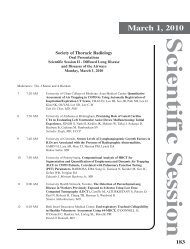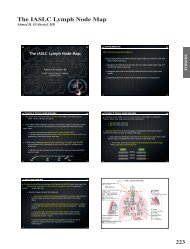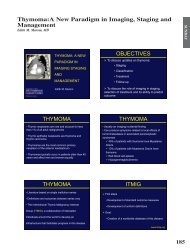Thoracic Imaging 2003 - Society of Thoracic Radiology
Thoracic Imaging 2003 - Society of Thoracic Radiology
Thoracic Imaging 2003 - Society of Thoracic Radiology
Create successful ePaper yourself
Turn your PDF publications into a flip-book with our unique Google optimized e-Paper software.
HIV-infection: Primary and Secondary Lung Infection<br />
Linda B. Haramati, M.D.<br />
Objectives:<br />
1. To describe and give examples <strong>of</strong> the various lung infections<br />
to which HIV-infected patients are predisposed.<br />
2. To describe the changes in distribution <strong>of</strong> infection with the<br />
waning immunity (as reflected by CD4) that is a usual feature<br />
<strong>of</strong> untreated HIV-infection.<br />
3. To describe changes in lung disease related to partial<br />
immune restoration by treatment with highly active antiretroviral<br />
therapy (HAART).<br />
Needs and Attributes:<br />
This lecture is designed for radiologists who interpret chest<br />
radiographs and CT scans. All such radiologists should be<br />
familiar with the classic and recent finding <strong>of</strong> HIV-related pulmonary<br />
infections.<br />
The recognition <strong>of</strong> HIV-infection in the early 1980’s was<br />
prompted by the description <strong>of</strong> Kaposi sarcoma in several gay<br />
men, and then by recognition <strong>of</strong> Pneumocistis carinii pneumonia<br />
(PCP) in patients who did not fit previous categories <strong>of</strong> immune<br />
compromise. Since that time, HIV-infection has reached epidemic<br />
proportions throughout the world and became a scourge<br />
in the United States. Unlike other forms <strong>of</strong> immune compromise<br />
such as organ transplantation and congenital immune deficiencies<br />
that are confined to a small population, HIV infection<br />
is widespread. Infection is the most common complication <strong>of</strong><br />
HIV-infection and the lung is the most frequently involved<br />
organ. This brief talk will give an overview <strong>of</strong> the wide variety<br />
<strong>of</strong> infections that occur in HIV-infected patients, how the<br />
patients’ immune status reflects the type <strong>of</strong> infections that they<br />
acquire, how HAART with partial immune restoration has<br />
decreased the prevalence <strong>of</strong> severe immunocompromise and<br />
how it has changed the course <strong>of</strong> several diseases.<br />
Although PCP is the pulmonary infection thought to be associated<br />
with AIDS, even early in the AIDS epidemic, bacterial<br />
pneumonia was recognized to occur more frequently. Infection<br />
with pneumococcal pneumonia, haemophilus and other usual<br />
species is most common. AIDS patients with bacterial pneumonia<br />
are more frequently bacteremic than their immune-competent<br />
counterparts. Although the incidence <strong>of</strong> bacterial pneumonia<br />
increases as the patients CD4 decreases, two or more<br />
episodes <strong>of</strong> bacterial pneumonia in a single year are AIDSdefining<br />
at any CD4 count. The chest radiographic and CT findings<br />
<strong>of</strong> bacterial pneumonia in HIV-infected patients are similar<br />
to that <strong>of</strong> the general population, although some authors describe<br />
more frequent multi-lobar involvement and pleural effusion. As a<br />
patient’s immunity wanes, various unusual bacterial infections<br />
including zoonoses are seen in HIV-infected individuals.<br />
PCP is a taxonomic misfit that has bounced from the protozoal<br />
to the fungal category-not fully belonging to either.<br />
Priviously, PCP was a common presenting infection leading to<br />
the diagnosis <strong>of</strong> AIDS. However, this presentation is currently<br />
uncommon, except in patients who have reduced access to<br />
healthcare. PCP generally occurs in patients with CD4 counts<br />







